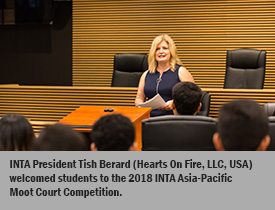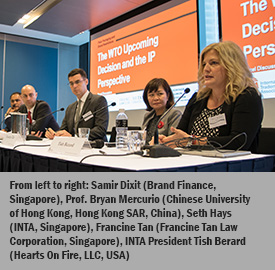The Challenges of Using Survey Evidence in England and Wales
Published: March 1, 2018
Adrian H. Smith Simmons & Simmons LLP London, UK
 The Year of the Dog started auspiciously for INTA in Singapore. On February 23 and 24, INTA conducted the inaugural Asia Moot Court Competition for trademarks. This was a groundbreaking event for the region, as it was the first competition among law schools in Asia on trademark law.
The Year of the Dog started auspiciously for INTA in Singapore. On February 23 and 24, INTA conducted the inaugural Asia Moot Court Competition for trademarks. This was a groundbreaking event for the region, as it was the first competition among law schools in Asia on trademark law.
INTA’s 2018 President Tish Berard (Hearts On Fire Company LLC, USA) presided over the competition and judged the final round with Justice Valerie Thean, Singapore Supreme Court, and Director Mark Lim, IP Office of Singapore, Hearings and Mediation Department. Twenty-four teams from nine countries participated in the event. INTA members from across Asia participated as brief readers and oral hearing judges in the lead-up to the final round. Both members and students were enthusiastic about the meeting. INTA looks forward to carrying on the new tradition next year to build upon this enthusiasm for trademark law among future lawyers and to develop the next generation of leading trademark attorneys. INTA Works with SMEs to Benefit from New Singapore IP Incentives
INTA Works with SMEs to Benefit from New Singapore IP Incentives
INTA took advantage of the presence of this year’s 2018 President in Singapore to engage local small and medium-sized enterprises (SMEs) and tech start-ups. As part of Ms. Berard’s term in office, she will be exploring how INTA can better work for and with SMEs with the establishment of a Presidential Task Force. Asia’s, and particularly Singapore’s, tech and SME scene is growing and dynamic. According to the ASEAN SME Service Center, SMEs in the region account for over 95 percent of total businesses and are the engine of economic growth in ASEAN, producing 23 percent and 58 percent of GDP and ranging between 51 percent and 97 percent of employment among ASEAN member states. Discussions with the SMEs focused on the importance of brands and the development path followed by these companies when they begin to grow their brands.
Companies in Singapore that are developing and using intellectual property (IP) may benefit from some tax changes enacted under Singapore’s recently announced 2018 budget. As part of Singapore’s push to be an innovation and IP hub, the government will be increasing tax deductions up to 200 percent for companies that license IP, with a cap at SGD 100,000 (approximately USD 61,500). Additionally, certain R&D costs will be deductible up to 250 percent per year. These benefits will certainly motivate companies to be more IP intensive, and draw more IP-intensive companies to Singapore. Additionally, the government is offering incentives for professionals to train in IP, thereby growing Singapore’s base of IP professionals.
Challenges to Brands in Singapore
Although Singapore is setting up some great incentives for brands and IP owners, challenges are coming for brands. Singapore’s Ministry of Health has a public consultation open on proposed legislation for mandating plain packaging on tobacco products.
INTA will be submitting comments to this proposed legislation, and has been actively raising the known issues this type of brand restriction presents to brands, innovation, consumer safety, and economic growth.
 On February 26, INTA and member firms Francine Tan Law Corporation and Soroker Agmon Nordman, Adovocates & Patent Attorneys co-organized a policy dialogue on the current state of brand restrictions and plain packaging. Jonathan Agmon (Soroker Agmon Nordman, Advocates & Patent Attorneys, Israel) opened the event by framing the legal question involved in this issue. Ms. Berard followed as the guest of honor, and in her presentation cited INTA’s extensive history of advocacy against brand restrictions, starting in the 1990s, when proposals in Brazil mandated pharmaceutical brands emphasize the generic name over brand names. The history of INTA’s intervention on brand restrictions in Asia was most notable in the Australia plain package case, where INTA submitted an amicus brief at the World Trade Organization (WTO) on behalf of brand owners.
On February 26, INTA and member firms Francine Tan Law Corporation and Soroker Agmon Nordman, Adovocates & Patent Attorneys co-organized a policy dialogue on the current state of brand restrictions and plain packaging. Jonathan Agmon (Soroker Agmon Nordman, Advocates & Patent Attorneys, Israel) opened the event by framing the legal question involved in this issue. Ms. Berard followed as the guest of honor, and in her presentation cited INTA’s extensive history of advocacy against brand restrictions, starting in the 1990s, when proposals in Brazil mandated pharmaceutical brands emphasize the generic name over brand names. The history of INTA’s intervention on brand restrictions in Asia was most notable in the Australia plain package case, where INTA submitted an amicus brief at the World Trade Organization (WTO) on behalf of brand owners.
INTA’s Chief Representative, Asia-Pacific Seth Hays presented INTA’s work on brand restrictions to date in the region, while Samir Dixit, Managing Director of Brand Finance (Asia-Pacific) delivered details of a recent research paper that emphasized the potential losses to brands should plain packaging move to industries such as alcohol and food and beverages. Professor Bryan Mercurio of the Chinese University of Hong Kong provided an insightful analysis of the WTO case and the possible legal arguments that could ultimately be the basis of the WTO’s decision in the case. INTA member Francine Tan (Francine Tan Law Corporation, Singapore) concluded the roundtable with an excellent summary of the implications for plain packaging on the future of brands.
INTA will continue raising awareness on brand restrictions in the region with a policy dialogue in Bangkok, Thailand, on March 29.
Although every effort has been made to verify the accuracy of items in the INTA Bulletin, readers are urged to check independently on matters of specific concern or interest.
© 2018 International Trademark Association
This website uses cookies so that we can provide you with the best user experience possible. Cookie information is stored in your browser and performs functions such as recognising you when you return to our website and helping our team to understand which sections of the website you find most interesting and useful.
To find out more please see our Cookies Policy and Privacy Policy.
These cookies are used to identify a user’s browser as the visitor goes from page to page on the Site. These are session cookies, which means that the cookie is deleted when you leave the Site. It is an integral piece of the Site software and used to let the server know which users are on the Site at any given time and make certain parts of the Site easier to use.
|
|
If you disable this cookie, we will not be able to save your preferences. This means that every time you visit this website you will need to enable or disable cookies again.
These cookies are used to collect information about how visitors use our Site. The cookies collect information in anonymous form, including the numbers of visitors to the Site, where visitors have come to the Site from, the pages they visited and how they have interacted with tools on the Site like search and embedded media players. We use the information to compile statistical reports of our users’ browsing patterns so that we can improve the Site.
|
|
Please enable Functionality Cookies first so that we can save your preferences!
These cookies are used to deliver advertising relevant to the interests of visitors to our Site. They are persistent, which means they will remain on your device after you leave the Site.
- Facebook (Ad Pixel)
- Google (Ad Pixel)
- LinkedIn (Ad Pixel)
- Quattro Anonymous
Please enable Functionality Cookies first so that we can save your preferences!
